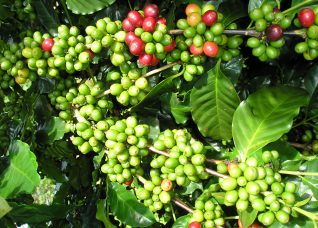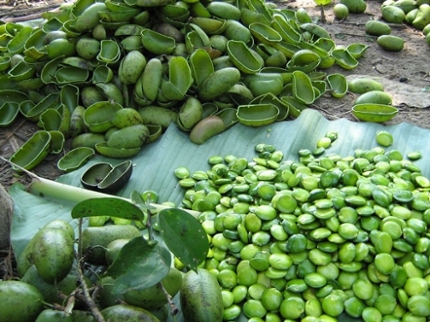
MinerAlert

MinerAlert
Griffonia simplicifolia
Fabaceae

Griffonia
Atooto, gbogbotri, kajya, kanya, kwakuo-aboto (Brenderl et al., 2010).
The root, seeds, and leaves
This shrub or liana is native to West Africa, especially Sierra Leone, Ghana, and the Congo.
Some companies commercialize the plant in capsules, purportedly as an antidepressant, aphrodisiac, and also as a weight loss supplement.
Due to its content of 5-HTP, a precursor of the neurotransmitter serotonin, this plant has been touted as an alternative for the treatment of insomnia. Supplements containing this plant, alone or in combination with other herbs, are also touted as being useful for appetite suppression, weight loss, fibromyalgia, as well as to treat motion sickness (Rondanelli, et al., 2011).
The seeds contain compounds known as “lectins”, which are proteins that bind to carbohydrates and play an important role in cell physiology. However, certain plant lectins are potentially toxic and Griffonia lectins may also have insecticidal activity (Zhu-Salzman et al., 1998).

Foto: Nootriment / Google images
Griffonia simplicifolia seeds
A study evaluated the safety and efficacy of a Griffonia seed extract and magnesium combination in two groups of children with motion sickness. The combination was comprised of 50 mg of G. simplicifolia and 200 mg of magnesium, intended as prophylactic therapy. The product was given by mouth twice a day for 90 days to the treatment group. The other group did not receive treatment for motion sickness. At the end of the study, the group treated with Griffonia showed a significantly lower (36%) prevalence of motion sickness, compared to the non-treatment group (73%). The results of the study indicate that the Griffonia plus magnesium combination could be a possible option for treating motion sickness (Esposito, et al., 2015).
Certain compounds contained in Griffonia may act as appetite suppressant and, therefore, could be useful in the treatment of obesity. For this reason, a randomized, double-blind, placebo-controlled study of 4-week duration was undertaken with 20 overweight women, 10 of whom were randomly assigned to supplement their diet with either an extract from G. simplicifolia, while the other 10 received a placebo. The study included a personalized reduced calorie diet for all participants. The primary objective of this study was to assess the efficacy of an herbal supplement containing 5-hydroxytryptophan or 5-HTP, administered via oral spray in healthy overweight women for 30 days, compared to placebo. The other parameters measured included the evaluation of body composition, appetite sensation, and the extent of binge eating. The results of the study demonstrated that the treatment group showed a statistically significant (p<0.001) increase of 24-hour urinary 5-HIAA levels, as well as a decrease in the Haber score. In comparison, no significant changes were detected in the placebo group. Additionally, statistically significant differences between the treatment groups were shown with regard to changes in body composition. However, other parameters were found to be similar among the treated and placebo groups. The researchers concluded that the 5-HTP contained in the Griffonia extract, administered via oral spray, was well absorbed, measured by the increase in 24-hour urinary 5-HIAA. Additionally, the supplementation of with 5-hydroxytryptophan in the diet of overweight women increased feelings of satiety linked to a decrease in BMI (Rondanelli et al., 2012).
Griffonia seeds are an important source of (5-HTP), a precursor of the neurotransmitter serotonin (5-HT). There is a potential value of employing Griffonia seed extracts in mood disorders. For this reason the aim of a study was to assess the effect of a seed extract on mood disorders, such as anxiety behavior. The seed extract, was orally administered to laboratory rats, dosed at 1, 5, 10 and 25 mg/kg. Additionally, the animals were subjected to the dark-light test and open field test, one hour after the treatment. With regard to the dark-light test, the extract given at the doses of 10 and 25 mg/kg was shown to significantly (P<0.05) augment the time spent in the illuminated compartment. In the open field test, the extract dosed at 5, 10 and 25 mg/kg originated an anti-tigmotactic effect in the experimental animals, as demonstrated by a statistically significant (P<0.01) increase of time spent within the central area of the open field. The authors of the study concluded that the Griffonia seed extract possessed an anxiolytic effect in rats, which could be a potential treatment for anxiety in humans (Carnevale et al., 2011a).
A study assessed the influence of a Griffonia seed extract on the sexual behavior of male rats. The extract was administered orally both acutely and sub chronically, at three dose levels: 25, 50 and 100 mg/kg, to Sprague-Dawley rats, for a period of nine consecutive days. A mating test was undertaken with receptive female rats one hour after the acute treatment, or the last dose when repetitively administered. The parameters recorded included mounting, intromission and ejaculation latencies, as well as post-ejaculatory intervals. Additionally, food intake and body weight were measured over the 9-day treatment period. A microdialysis technique was employed to detect the extracellular levels of serotonin and its metabolite (5-HIAA) in rat brains after the acute administration of the seed extract as 100mg/kg dose. The results showed that, at any dose, the acute treatment significantly increased mount latency, while at 100 mg/kg, intromission and ejaculation latencies were observed, and the post-ejaculatory interval was seen at 50 and 100 mg/kg. In contrast, the sub-chronic treatment did not show a salient influence on copulatory behavior. The daily administration of the seed extract at 50 and 100 mg/kg doses for 9 days significantly reduced both food intake, as well as body weight. With regard to the microdialysis experiments, the researchers noted a significant increase in 5-HT and its metabolite 5-HIAA (Carnevale et al., 2011b).
A new β-carboline alkaloid, known as “griffonine” was isolated from Griffonia, along with 7 previously known alkaloids, two of which demonstrated inhibitory actions on the HepG2 cell line, while others showed cytotoxic activities. More research is needed to evaluate the potential benefit of the plant on liver cancer (Wang, 2013).
Safety/Precautions:
Before you decide to take any medicinal herb or herbal supplement, be sure to consult with a health care professional first. Avoid self-medication and self-diagnosis: Always be on the safe side!